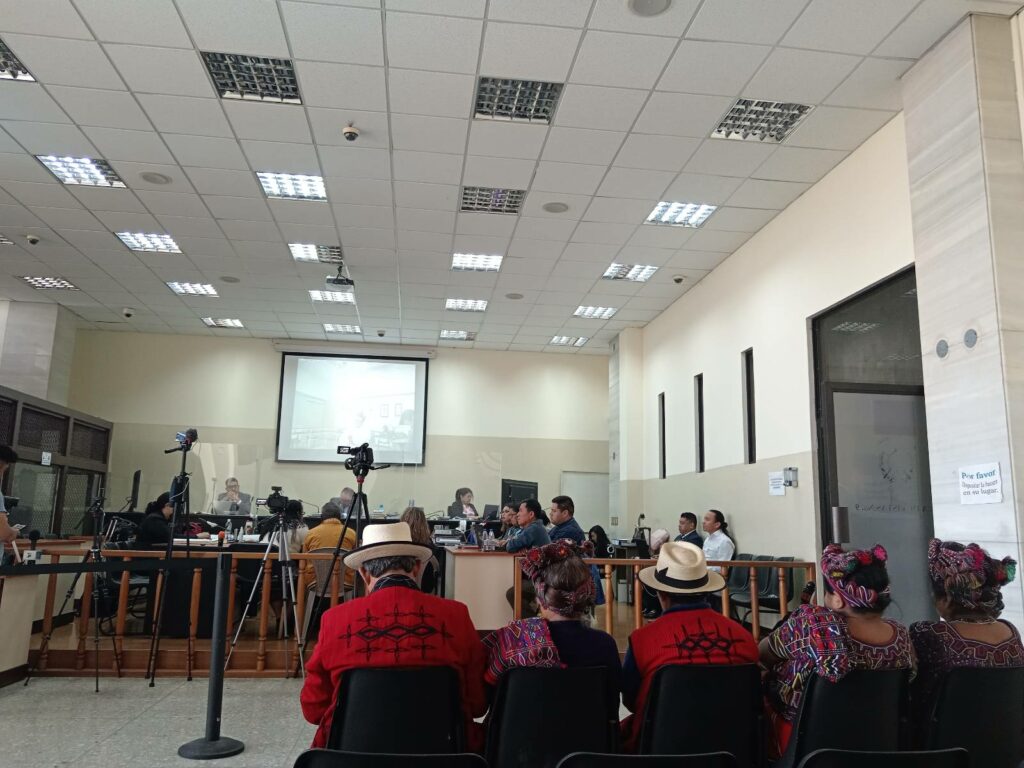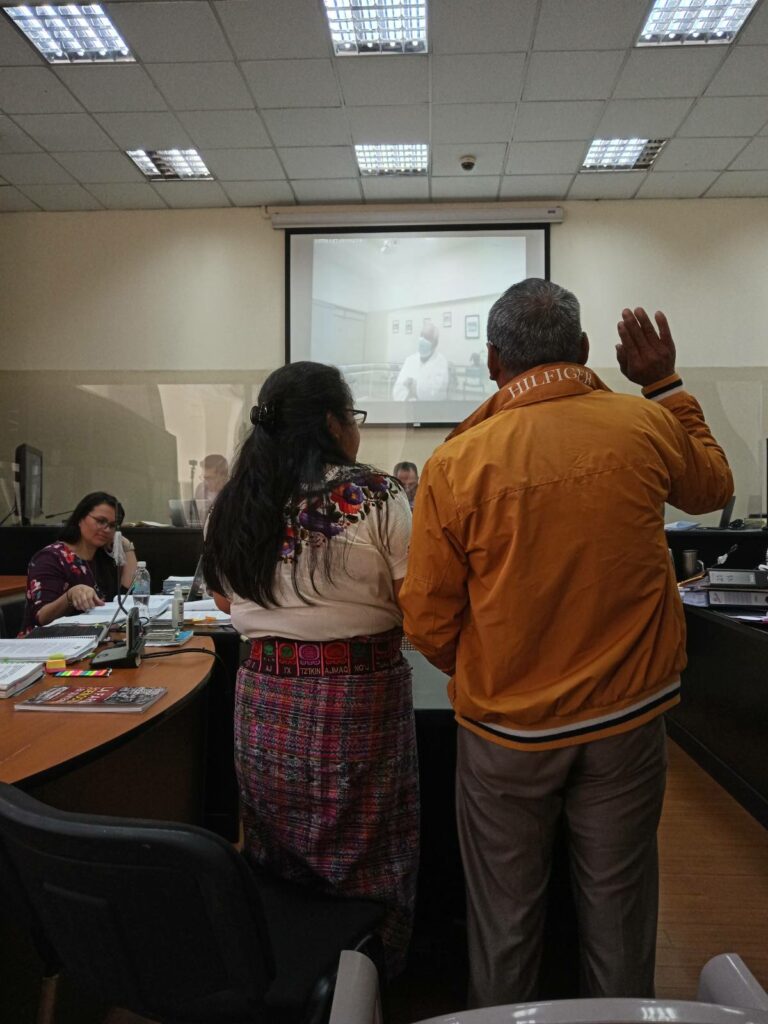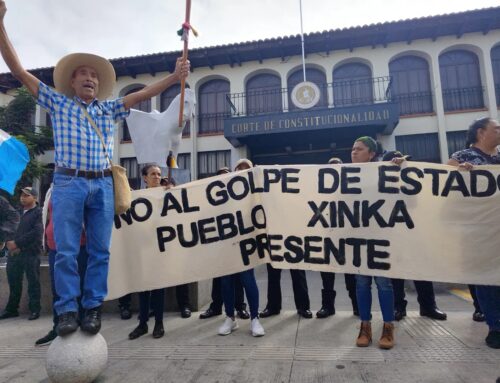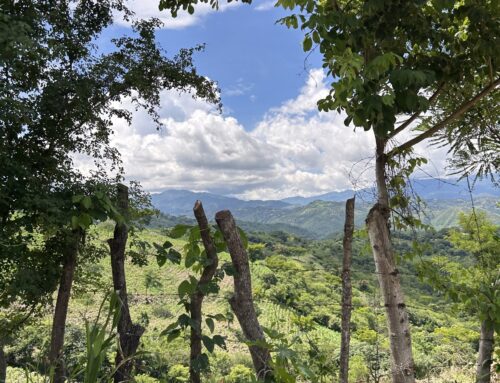The Ixil Genocide trial against Benedicto Lucas García continued this week, April 15-19. During the hearings, members of the Association for Justice and Reconciliation (AJR) were present, as well as members of of the Ancestral Ixil Indigenous Authorities of Nebaj, and representatives from civil society and the international community. 10 witnesses testified* as well as two forensic experts.
The testimonies demonstrate firsthand the impact of the massacres that occurred in the state of Quiché between 1981 and 1982, the murders perpetrated against the family members and community of survivors, the loss of homes and belongings, their grinding stones, garments, as well as the quality of life of babies, children and the elderly, who, while in hiding in the mountains suffered from hunger, illnesses, persecution, and constant fear.
The most painful moments of this violent story were recorded on their bodies, physically, emotionally, mentally, and spiritually. Despite their age, health situations, and distance traveled to be present in the hearing this week, Benacio, Baltazar, Clet, Antonia, Catarina, Pedro, Juan, and Ana offered their testimony with great strength. “We are here for those that cannot be. For children, fathers, mothers, brothers, sisters, friends, neighbors, comrades in life, and we demand justice.”
We invite you to bear witness to their testimony in the following excerpts.
Monday April 15, 2024
- Testimony of Domingo Velasco
His testimony was presented in an audio recording from July 3, 2013 as anticipated evidence. This was presented before the First Criminal Court in Guatemala City.
He testified in the trial to share about the people who had been murdered, as well as the forced displacements that occurred in his community in the municipality of Santa Maria Nebaj. He was displaced and ended up living in the hills of Nebaj, where he stayed for four years out of fear. While he was living in Nebaj, the soldiers forced him to be a patroller (PAC), gave him weapons, and he “patrolled” for 4 years.
He remembers on April 10, 1981 that the soldiers came from Cotzal and at around 5pm when they arrived to his town, they massacred children and babies. “We were scared. When the army arrived, they burned houses and killed 59 people.”
“They were shot with firearms. Women and children were killed in one place. The community was divided by a road. All those who lived on one side of the road were killed. Something like 14 families. It was almost night time. We could only hear gunshots. Five houses were burned with all of their residents. They burned them while they were inside their own homes. Their names were Andres Brito, Gaspar, Nicolas, the other names I have since forgotten because more than 35 years have passed. They were all from Nebaj and spoke the Ixil language.”
He mentioned that they did not bury the murdered community members under any particular tradition. They just dug a pit, threw down some sleeping mats, and placed one on top of the other.
“They arrived at 5pm, and were gone by 9 pm. Our community produced liquor. They drank our liquor, threw our things everywhere, killed our animals, and left. We were so afraid and convinced that they would return, that we fled to the mountains for four months and returned to the community very cautiously. We were 15 people who went to the mountains. There were children with us, and it was insufferable. We only had sheets of plastic to protect us from the rain.”
“Because of the war, we are poor. We lost so very much. It’s hard to recover all that we lost in that moment. They killed our animals.”
- Testimony of Benancio. Age 63 years old. Native of Xolcuay Village, Municipality of San Gaspar Chajul, Quiché.
On February 28, 1982, the soldiers came down from Nebaj and arrived in Xolcuay and there they killed Supapá, his mother and brothers. That day in Xolcuay they gathered all the people, took them out of their house, gathered them in one place and killed them. “My dad Pedro, my mom María and my siblings Miguel, Juana and Juan.”
He was 21 years old. He was the oldest brother. The youngest was Juana, a baby.
“The soldiers came, took them out, gathered the people and killed them. I fled and saw them the next day when the soldiers returned to the detachment. They were already dead when we arrived. The bullet entered their hearts. I don’t know how many survived. There were more who did not die. I don’t know why they were killed.
There were pregnant women. Mara Itzel was one of them. Her pregnancy was already noticeable: “They just killed her and left her there.”
“I was able to bury my family members. When I arrived, other neighbors were already burying theirs. When we buried them we only put a poncho around them. The remains of my relatives were already found in an exhumation, at first I buried my whole family in one hole. They have already been identified. Now their remains are in the cemetery.”
“The soldiers burned our house and belongings. They burned all the houses. I played a marimba and they burned it.”
He took refuge in the mountains: “I spent a year and a half in the mountains in the Ixcán. For a year and a half we slept under nylons. There was nothing to eat, but we found herbs and malanga, then we planted our cornfield on the mountain. While we were in the mountains, the soldiers arrived and we left again. When we were in the mountains, because the traditional Ixil clothing is red, they saw it and bombed us.”
“When we got sick we cured ourselves with herbs. We couldn’t go to a medical center because we were in the mountains and the soldiers were in the military base.”
The people who died in the mountains died of hunger and the subhuman conditions to which they were forced by the persecution of the soldiers.

Photo by NISGUA. Guatemala City, April 2024
Tuesday, April 16, 2024
- Testimony of Baltazar, 71 years old. Xolcuay village, Nebaj.
“We were in our house when we heard that they shot our compañeros in Xolcuay. Then the soldiers came to our village, they burned our house. They burned a total of 25 houses, they burned my corn and beans. I had it in storage, that’s our custom. We fled to the mountains when we knew the soldiers were coming, that’s why there were no deaths. After they burned our house we could not return to our houses and we could not recover our land. When they burned the houses they burned the documents and stole it from us”.
“We went to the village Xolcuay, we found that the soldiers left written on the Catholic church that they had killed 118 people. When we arrived there were dead bodies piled up, some of the bodies of naked women. We cried. We made holes and left them there, we didn’t do a ceremony or anything, we were afraid. Today I ask the court for justice.”
“We went to San Juan Ixcán. We suffered from hunger, we slept in the undergrowth. There were people who died of hunger. While we fled to Ixcán there were also helicopters dropping bombs. In Ixcán we were able to plant our cornfield, we had already harvested it when the soldiers arrived again.”
- Testimony of Cleto, 64 years old. Originally from Chajul, department of Quiché.
“The soldiers took my older brother, younger brother and my brother-in-law, and I am here today because of them. One Sunday in February 1982, the soldiers passed by and took my family. I lived in Aldea Xolcuay. We were in the house when the soldiers arrived, they were all carrying guns. After all this I went to the coast, I lived there for 7 years, I was cutting cane in Escuintla. I returned several years later to the village and the soldiers recruited me, they forced us to patrol, they gave us a gun and taught us how to shoot. Before we couldn’t speak well because we are afraid, before we didn’t have rights and now we do, that’s why I am here.”
- Testimony of Antonia, Xolcuay, Chajul, Quiché.
“Before starting to plant we used to pray, that year when the war started we got together and prayed for what was happening. We were six brothers before the war started, but the soldiers took two of us away. Juan Chibalam was taken by the soldiers, they said he was going to go as a soldier, but we never found him, they took him from Finca San Francisco, he had gone to work, he left in May 1981. My father went to look for my brother, he went to Quiché and Huehuetenango. After all these years we have not found him, we are still looking for him. They have exhumed other people but we still haven’t found him.”
“On February 28, 1982, there was a lot of damage in the Xolcuay Village. The soldiers arrived a week before and told us not to run away, that they were going to meet with us on February 28. They said they were going to arrive to take care of us. They arrived on foot, it was Sunday and they started shooting. They gathered the people together and killed them, there were more than 80 people. There were women and men, they stacked them as if they were firewood, that is, they piled them up. There were pregnant women who had had their belts tightened, other women had had their skirts pulled up over their heads, there were children and babies of maybe a week old who had been eaten by dogs and pigs. Many of the women were weavers or they worked planting crops.”
“The helicopters came and circled over us, but we were hiding under the trees, they were green, they were shouting, but we didn’t understand. In the Xolcuay massacre the most impressive thing I saw was all the people crying, there were two friends of mine dead, one was called Berta Ramos and the other was Isabela Michicoc. Isabela died with her mother”.

Photo by NISGUA. Guatemala city, April 2024
Wednesday, April 17, 2024
- Testimony of Catarina. Age 72 years old. Originally from Quiché.
“My mother died because of the violence. Before the violence in Chisis we celebrated Mayan ceremonies and the marimbas came to play for any activity. The men planted corn, the women made rope and sold it in the market, the children learned to work and played. There were many houses, it was a whole village, we were all from Cotzal”.
“The violence started when the soldiers arrived, we didn’t know their way of thinking. Many people died. We suffered. February 13, 1982 was the day when everyone died, only some of us managed to get out, our houses were burned. It was harvest time. It was 5 o’clock in the morning when the soldiers arrived, they came on foot because our roads at that time were narrow. They came shooting. They shot some people, others they cut their necks with machetes. I went to hide in the mountains, it was two days walking.”
“I saw smoke over the houses, they were burning. I was very sad and I couldn’t go back. That day my mother died, the house burned and my mother was left in ashes. My mother was 60 years old. Only I escaped, my mother stayed because she said that if we fled we would die of hunger. Our animals and grinding stones stayed in the house.”
She managed to get out with her brother Antonio, who told her that she had to hide because there was a lot of prejudice against them. “I lived in the mountains for a year. We had no food, no tortilla, we only prayed and that filled us up, when we found some fruit that’s what we ate, sometimes we found sugar cane, an orange or some squash. Sometimes we would cook herbs or malangas, we finished the year like that. During that year the soldiers looked for us like animals, if they looked at us, they would launch bombs at us. Sometimes they would throw bombs at us twice, sometimes they would notice when we were washing, some of us died because of that, and others ran away, we looked like animals searching for where to go.”
“As Ixiles when we were in the mountains we were not happy, we were sad, it is not like being at home and being able to prepare our tortillas. While we were in the mountains, my daughter died, she was one month old, she died of hunger because I had no breast milk to give her. Her name was Ana. When we got sick in the mountains we used leaves and it calmed the sickness. While we were walking in the mountain, there was one companion who died sitting down, he no longer had the strength to continue and we could no longer move him. Several people died of hunger.”
“I saw how they burned my house and my things, nobody told me. I came here with my own thoughts, I’m an adult now and the authorities here can do justice.
- Testimony Pedro, 72 years old, Chisis Village, San Juan Cotzal municipality, Quiché.
“In February 1982 I was in the mountains near the village because the soldiers were chasing us. I already had children at that time. My wife was recovering from having given birth to one who died in the mountains, her name was Ana. My other children, Miguel was 8 years old and Francisco was 9 years old”.
“It was 5am when the soldiers arrived, we ran away. They took my house, they burned my house and my things. I didn’t know how many there were, they couldn’t be seen, my house was 20 yards from the road. When I went out to see, I saw that they were killing people. I was very scared, I ran out with my wife and children. That day many people died, I can’t count how many there were, only some managed to escape, there were old people and children, they killed several people, and I don’t know why”.
“They killed my wife’s mother, Doña Manuela, she didn’t want to leave the house so they locked her in and set fire to the house. I arrived at Antonio’s house, my neighbor, he had his own knife in his neck.”
“In Chisis there were about 70 houses, they burned everything and took some of our things, but people watched them go by and nobody said anything to them. All the houses were made of straw, some used tin, but we poor people lived with straw, some were made of sticks, not planks.”
“I didn’t go back to Chisis, I was afraid, I stayed in the mountains. We buried our daughter Ana in the mountain, she was very small and had no bones, if we look for her now we won’t find her. She died when she was about 4 months old, she was very tiny, she died very quickly. There was no food, we ate any weeds we could find, no salt, no meat”.
In the village there were no weapons, none of us had any. Nobody warned us that the soldiers were coming, if they had warned us maybe so many people would not have died. When we were in the mountains when we saw the soldiers we hid from them.
“Nobody forced me to come, I came voluntarily, we are poor and nobody can help me. I ask this court for good, that what we lived through does not happen again. I have never commented before, I am commenting today because I am before an authority.”
- Testimony of Juana 58 years old. Chisis Village, Quiché.
“On February 13, 1982 in the village of Chisis, there was a massacre and people died. The massacre began around 5am, we heard a bullet and we asked ourselves: what could it have been, we heard the screams of the people and soon they began to burn the houses, they were complaining and the dogs were barking. My uncle arrived to tell us that the soldiers were coming, they grabbed my uncle and cut his head off with a machete. My uncle’s name was Francisco, he was already a big man. Those who killed him were dressed in white and green, I was scared and could only escape when I saw his head on the ground.
“I had a son, but he stayed in the house, he didn’t make it out, he burned to death, he was 6 months old, his name was Antonio. The soldiers had never arrived before, we didn’t see where they came from. We did not return to my village, if we returned we would die. Nobody went to bury the dead, the dogs ate them.”
“I ask the judges, to help us for what we lost, we lost our houses, clothes, grinding stones, we had bees, we sold honey, that’s what we did before the violence. It is very sad what we lived through, they burned our houses, we were left without food, if we had my mother she would be here accompanying me, we suffered a lot.”
- Testimony of Ana. Chisis Village, Quiché.
“In February 1982, in Chisis Village, they burned houses and my father and brothers were killed and they were also burned. I heard several shots, I heard several people and children screaming because they were dying. The soldiers came to kill them. All those who arrived, they came dressed as soldiers, there were many soldiers and I saw that they were killing people.”
“In my family everyone was already awake when the soldiers arrived, it was just dawn. I got scared and ran away because there were several shots. Everyone tried to figure out what to do, and they ran away like little chicks.”
“My dad planted maguey, that day he was going to go to sell in the market because it was a Saturday, because he is poor and wanted to make a little money, but that day they came to kill him. They shot my dad in the forehead. They stabbed my mother, they killed her like a pig. They also shot my brothers in the head. I had two children: Juana and Domingo, I took my two children to the mountains with me”.
They managed to bury their relatives, they came back three days after the soldiers left, we buried them near her house. She put two of them in a hole, she buried them two by two because she was afraid that the soldiers would return. Now they have been exhumed.
“I didn’t notice if other people came to bury their relatives, I arrived quickly so I could go back to hide in the mountains. I was hidden for a long time, I don’t remember how long because I was scared. In the mountain we ate grass, we cried from hunger, we didn’t wear coats.
“Neither me nor my dad nor any of my relatives had weapons, we don’t know why the army did that, they only came to kill.”
“I came to testify so that good can be done because it is very sad. I also want peace because I have grandchildren and great-grandchildren and I don’t want them to live that. I came of my own free will because what happened makes me sad.”

Photo by NISGUA. Guatemala City, April 2024.






Leave A Comment